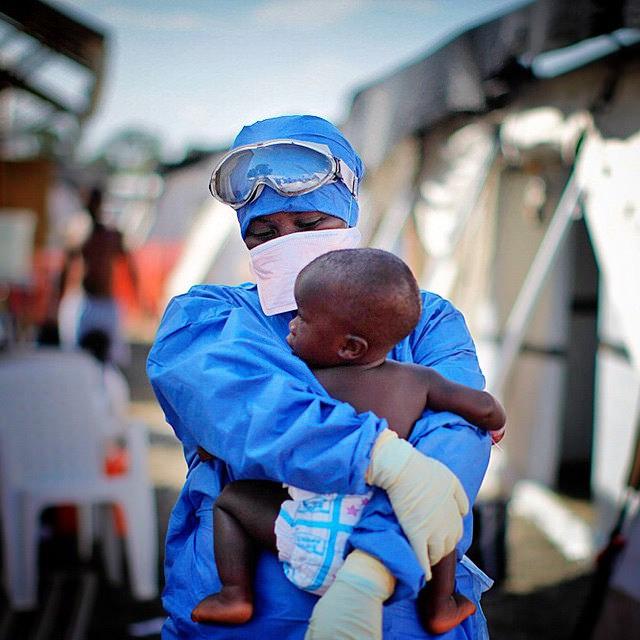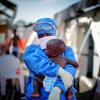The growing number of people in West Africa who survived Ebola face stigma and other complex issues because of the unique nature of the disease, and efforts to understand and meet their needs are yielding key lessons for responders, according to reports today from the US Centers for Disease Control and Prevention (CDC).
Case-fatality rates in the Ebola epidemic range from 60% to 70%, meaning there are now thousands of survivors, the CDC said today. In Sierra Leone as of Dec 6, 1,181 people were known to have been treated and discharged.
Of two reports released today, one details survivor needs and services provided to survivors in Sierra Leone, and the other describes how Firestone Liberia reintegrated survivors into their communities. Both reports appear in early online releases from Morbidity and Mortality Weekly Report (MMWR).
Ebola survivors face not only the emotional toll of stigma, grief, and survivor guilt, but often the loss of many of their possessions—such as bedding, clothes, and other household items—from destruction to curb virus transmission. Health experts have said reducing stigma from the disease is an important part of encouraging infected people to step forward and be treated, a key to reducing the spread of the disease.
Those who survive are thought to have some immunity to the strain that sickened them, so some are now working to care for other Ebola patients, the CDC said.
CDC Director Tom Frieden, MD, MPH, said in a CDC press release today, "Nothing says more about the resilience of the human spirit than Ebola survivors who become role models for their communities."
Sierra Leone teams inventoried attitudes, services
In the first report, experts from the CDC and their partners from Sierra Leone's health ministry and other groups conducted a survey in August to gauge knowledge, attitudes, and practices regarding Ebola. It revealed that 96% of the general population has some discriminatory attitude about people with suspected or known Ebola.
The report also described an October assessment of the needs of survivors in three of Sierra Leone's districts: Bo, Kenema, and Bombali. It found that survivors grappled with a host of immediate and long-term issues that included physical and mental health, stigma, psychosocial problems including shame and survival guilt, reintegration needs, and financial needs. In addition, they reported inadequate counseling, reintegration, and material support.
Survivors expressed strong interest in contributing to Ebola response efforts, such as sharing their experiences through radio and TV and helping provide medical and spiritual care to people sickened by the disease.
The consortium that did the needs assessment is coordinating support for survivors, including a "survivor packet" including money, bedding, clothes, and other daily essentials. They are also arranging for counselors to accompany survivors as they return home to their villages, to help smooth the reintegration process by speaking with local authorities and community members.
Also, district-level survivor support centers are being established and steps are underway to integrate Ebola survivors into response activities.
Firestone model includes reintegration ceremony
The second report describes reintegration steps facilitated by Firestorne Liberia Inc., which provides health care to 80,000 residents .The company operates a large rubber plantation in central Liberia's Firestone district. From Aug1 through Nov 1, 33 people died from Ebola at the Firestone Ebola treatment center, but 22 survived.
The district developed its own survivor reintegration program, enrolling its first patient in August. During the 3-day time span between tests to confirm survivors' blood was free of Ebola, they were given education and counseling. Meanwhile, teams started preparing survivors' communities by meeting with neighbors and community leaders and emphasizing that the people coming home were no longer sick and were free of the virus.
On the survivor's return day, staff from Firestone's treatment center and others traveled home with the recovered patient. Community members decorated survivors' homes with palm leaves to mark a festive occasion.
Survivors were given a "solidarity kit" that included a new mattress, bedding, towels, an insecticide-treated mosquito net, food, clothing, toys for children, and cash, according to the report. After a reintegration ceremony, Firestone medical staff visits all survivors weekly for 3 months to provide clinical assessments and psychosocial support.
The team reports that so far reintegration ceremonies have been attended by community members and have been celebratory rather than confrontational.
Other developments
- The most recent patient infected with Ebola in Mali has survived and been released from treatment, the Associated Press (AP) reported today, citing the country's health ministry. So far 8 cases, 6 of them fatal, have been reported in Mali. Though no new confirmed or suspected cases have been reported over the past few weeks, health officials are still monitoring 26 people who may have been exposed to the virus.
- Though global cereal crop production is expected to reach a record 2.5 billion tons for 2014, 38 countries are still at risk of food insecurity, according to a report yesterday from the United Nations (UN) Food and Agriculture Organization (FAO). It said the Ebola epidemic is one factor in food insecurity for some areas. Others include civil conflicts and adverse weather.
- In an update today, the World Health Organization (WHO) said the total number of people infected in the Ebola epidemic has reached 18,188, with the death count rising to 6,583. The total includes cases reported by Guinea and Sierra Leone as of Dec 19 and by Liberia as of Dec 7. Sierra Leone has the most illnesses, 8,069, while Liberia has the most deaths, 3,222.
See also:
Dec 12 MMWR report on Ebola survivors in Sierra Leone
Dec 12 MMWR report on Ebola survivors in Liberia's Firestone district
Dec 12 CDC press release
Dec 12 AP story
Dec 11 UN press release
Dec 12 WHO Ebola case count



















